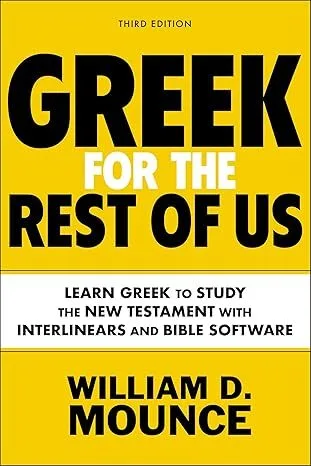Pronunciation Guide: eh-AHN (rhymes with “be on”)
Basic Definition

Key Information
ἐάν

Strong’s Entry
g1437
Strong’s G1437: The Greek particle ἐάν (ean) is a conditional conjunction that introduces a hypothetical situation or possibility. It typically means “if,” “whenever,” or “in case that,” suggesting a condition upon which something else depends. This small but powerful word establishes the framework for conditional statements throughout the New Testament, presenting scenarios that might occur and their potential consequences.
Etymology and Morphology
- Part of Speech: Conjunction/Conditional particle
- Origin: Compound of εἰ (ei, “if”) and ἄν (an, a particle expressing contingency)
- Primary Usage: Conditional clauses, hypothetical scenarios, general statements about possibilities
- Context: Appears frequently in teachings, especially in the Gospels and Epistles, often in “if-then” constructions
- Formation: A blend of two particles that together create a stronger conditional expression than either alone
- Literary Function: Creates rhetorical frameworks for ethical instructions, theological statements, and promises
ἐάν Morphology:
- ἐάν – standard form used in conditional statements (“if”)
- ἐὰν – variant spelling with same meaning
- κἄν – contracted form of καὶ ἐάν (“and if,” “even if”)
Origin & History
The conditional particle ἐάν emerged from the combination of two earlier Greek particles: εἰ (ei) meaning “if” and ἄν (an), which adds a sense of contingency or possibility to verbs. In classical Greek literature, including the works of Plato and Aristotle, we find this construction evolving toward the more standardized ἐάν form that dominates Koine Greek.
In the Septuagint (LXX), ἐάν frequently translates the Hebrew conditional particle אִם (im), establishing important conditional structures in covenant language. For instance, in Exodus 19:5, the conditional nature of God’s covenant is expressed through this particle: “Now therefore, ἐάν you will indeed obey My voice and keep My covenant…” This conditional framework became foundational for understanding the relationship between divine promise and human responsibility throughout biblical literature. The early Church Fathers, particularly Origen in his Contra Celsum and John Chrysostom in his homilies, expanded on the theological significance of conditional statements introduced by ἐάν, especially when discussing salvation, faith, and obedience.
Expanded Definitions & Translation Options
- Simple Condition: Introduces a hypothetical scenario that may or may not occur
- Iterative Condition: Expresses a recurring condition (“whenever,” “as often as”)
- General Condition: States a timeless or universal principle dependent on certain conditions
- Concessive Use: Indicates “even if” or “although” when combined with καί (kai)
- Indefinite Temporal: Can function like “when” or “whenever” in certain contexts
ἐάν Translation Options:
- “If” – Most common translation, appropriate when expressing a simple condition upon which something else depends (Matthew 4:9)
- “Whenever” – Useful when the condition has a recurring or iterative aspect (1 John 1:9)
- “In case” – Helpful for contexts emphasizing preparedness for a potential scenario (1 Corinthians 14:6)
- “Provided that” – Emphasizes the necessary condition for something to happen (John 15:7)
- “Should” – Works well in English to convey a hypothetical possibility (Matthew 18:17)
Biblical Usage
The ἐάν construction appears over 350 times in the New Testament, making it one of the most significant conditional particles in biblical Greek. It frequently introduces conditions related to faith, obedience, and divine promises. In Matthew 4:9, its first New Testament appearance, Satan uses ἐάν in his temptation of the Messiah: “All these I will give you, if [ἐάν] you will fall down and worship me.” This sets up a pattern where ἐάν often introduces pivotal moments of decision or testing.
In the teachings of Yeshua (Jesus), ἐάν frequently appears in ethical instructions and spiritual promises, establishing clear cause-and-effect relationships between human actions and divine responses. John’s writings employ this construction extensively to discuss conditions of fellowship with God and assurance of salvation. Paul uses ἐάν to establish theological principles and practical applications, particularly when discussing scenarios the believers might encounter in their communities.
- “And said to Him, ‘All these things I will give You if [ἐάν] You fall down and worship me.'” Matthew 4:9
- “If [ἐάν] you love Me, you will keep My commandments.” John 14:15
- “If [ἐάν] we confess our sins, He is faithful and righteous to forgive us our sins and to cleanse us from all unrighteousness.” 1 John 1:9
- “If [ἐάν] anyone’s work is burned up, he will suffer loss; yet he himself will be saved, yet so as through fire.” 1 Corinthians 3:15
- “If [ἐάν] you abide in Me, and My words abide in you, ask whatever you wish, and it will be done for you.” John 15:7
- “If [ἐάν] we live by the Spirit, let us also walk by the Spirit.” Galatians 5:25
- “But if [ἐάν] we walk in the Light as He Himself is in the Light, we have fellowship with one another, and the blood of Jesus His Son cleanses us from all sin.” 1 John 1:7
Cultural Insights
In ancient Jewish thought, conditional statements were central to understanding covenant relationships. The structure of many Jewish blessings (berachot) followed a conditional pattern that parallels the ἐάν constructions in the New Testament. These blessings often implied “if you acknowledge God’s sovereignty, then you receive the blessing.” This pattern of conditionality was deeply embedded in Jewish religious consciousness and helps explain why ἐάν appears so frequently in the teachings of Yeshua and the apostles, who were communicating within a Jewish theological framework.
The rabbinic method of teaching known as “kal vachomer” (light and heavy) often employed conditional reasoning similar to ἐάν constructions. This form of argumentation reasons from minor to major cases: “If this is true in a lesser case, how much more in a greater case!” Yeshua employed this method frequently, as in Matthew 7:11: “If [ἐάν] you then, being evil, know how to give good gifts to your children, how much more will your Father who is in heaven give what is good to those who ask Him!” This cultural backdrop enriches our understanding of how ἐάν functions rhetorically within the New Testament’s Jewish context.
Theological Significance
The prevalence of ἐάν in Scripture reveals a profound theological truth: God has established a world of genuine contingency and possibility, where human choices matter. Rather than presenting a deterministic universe, the biblical authors use ἐάν to highlight the relational dynamic between divine sovereignty and human responsibility. God’s promises are often presented conditionally, inviting human participation in the divine plan while maintaining Yahweh’s ultimate authority and faithfulness.
This conditional particle appears prominently in passages about salvation, sanctification, and spiritual growth, revealing that while God’s love is unconditional, many of His promises are presented with conditions that require human response. In John 8:31-32, Yeshua declares, “If [ἐάν] you continue in My word, then you are truly disciples of Mine; and you will know the truth, and the truth will make you free.” This conditionality doesn’t undermine grace but rather illuminates how grace operates—inviting participation rather than imposing transformation. The ἐάν constructions throughout Scripture remind us that God has created us with genuine agency within His sovereign purposes, respecting our will while drawing us toward His perfect will.
Personal Application
Understanding the conditional particle ἐάν invites us to embrace both the responsibility and opportunity that God’s conditional promises present. When Scripture says, “If we confess our sins…” or “If you abide in Me…” we’re being invited into active participation with God’s work in our lives. These aren’t burdensome conditions but doorways to blessing that God has graciously provided.
Consider identifying the “if-then” statements in Scripture that speak to your current circumstances. What conditions has God established for the spiritual growth or breakthrough you seek? Rather than viewing these as restrictive requirements, recognize them as the Creator’s instructions for how His spiritual universe functions. Just as physical laws like gravity aren’t arbitrary restrictions but descriptions of reality, God’s conditional promises reveal the spiritual principles that govern our relationship with Him. By aligning ourselves with these principles—introduced by that small but mighty ἐάν—we position ourselves to experience the fullness of God’s promises.
Related Words
- εἰ (ei) – “if”; a simple conditional particle without the contingent force of ἐάν, often used for first-class conditions assumed to be true for the sake of argument. Pronunciation: “ay” (rhymes with “day”). See G1487
- ὅταν (hotan) – “whenever”; a temporal conjunction with conditional force, combining ὅτε (when) with ἄν. Pronunciation: “HO-tahn”. It emphasizes the temporal aspect of a condition more strongly than ἐάν. See G3752
- ἵνα (hina) – “so that, in order that”; a purpose conjunction that can sometimes function alongside conditional statements to express purpose or result. Pronunciation: “HEE-nah”. While ἐάν introduces the condition, ἵνα often introduces the intended outcome. See G2443
- ἄρα (ara) – “therefore, then”; an inferential particle often used in the conclusion of conditional statements. Pronunciation: “AH-rah”. It frequently appears in the “then” portion following an ἐάν condition. See G686
- μή (mē) – “not”; a negative particle often used with ἐάν to form negative conditions (“if not”). Pronunciation: “may”. When combined as ἐὰν μή, it creates an exception clause (“unless,” “except”). See G3361
Did you Know?
- Did you know that in New Testament Greek, ἐάν typically introduces what grammarians call “third-class conditional statements,” implying possibility rather than certainty? This grammatical feature reflects the biblical worldview that acknowledges genuine human choice within God’s sovereign plan. When Yeshua says “If you love Me, keep My commandments,” He’s acknowledging the reality of human volition while directing it toward righteous ends. This reveals a God who values relationship over mere compliance.
- Did you know that the conditional particle ἐάν appears most frequently in the writings of John (especially in 1 John), suggesting his particular theological interest in the conditions for genuine fellowship with God? John’s repeated use of ἐάν constructions creates a practical theology that balances divine grace with human responsibility. His “if-then” statements don’t establish works-righteousness but rather describe the authentic Christian life as it naturally unfolds when one truly abides in the Messiah.
- Did you know that in modern Greek, ἐάν has evolved into the simplified form άν (an), but still retains its conditional function? This linguistic evolution demonstrates how this crucial conditional concept has remained important throughout the development of the Greek language for over two millennia. Just as the word has maintained its essential meaning while adapting its form, the theological principle of divine conditionality continues to speak to believers across cultural and historical contexts.
Remember This
The humble conditional particle ἐάν reveals a profound truth about our God: He has designed a universe where our choices matter, creating genuine possibilities within His sovereign purposes—not to burden us with requirements, but to invite us into the joy of partnership with Him.
Note: While this entry strives for accuracy, readers engaged in critical research should verify citations and keyword occurrences in their Bible translation of choice. For Biblical citations, the F.O.G Bible project recommends Logos Bible software.
Strong's g1437
Add Comment
God's Word is too vast for a single perspective. We all have a story, and as believers we all carry the Holy Spirit who is the Revealer. With this in mind - I would love to read your comments.




